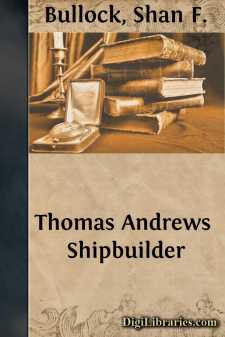Categories
- Antiques & Collectibles 13
- Architecture 36
- Art 48
- Bibles 22
- Biography & Autobiography 813
- Body, Mind & Spirit 142
- Business & Economics 28
- Children's Books 17
- Children's Fiction 14
- Computers 4
- Cooking 94
- Crafts & Hobbies 4
- Drama 346
- Education 46
- Family & Relationships 57
- Fiction 11829
- Games 19
- Gardening 17
- Health & Fitness 34
- History 1377
- House & Home 1
- Humor 147
- Juvenile Fiction 1873
- Juvenile Nonfiction 202
- Language Arts & Disciplines 88
- Law 16
- Literary Collections 686
- Literary Criticism 179
- Mathematics 13
- Medical 41
- Music 40
- Nature 179
- Non-Classifiable 1768
- Performing Arts 7
- Periodicals 1453
- Philosophy 64
- Photography 2
- Poetry 896
- Political Science 203
- Psychology 42
- Reference 154
- Religion 513
- Science 126
- Self-Help 84
- Social Science 81
- Sports & Recreation 34
- Study Aids 3
- Technology & Engineering 59
- Transportation 23
- Travel 463
- True Crime 29
Thomas Andrews Shipbuilder
by: Shan F. Bullock
Description:
Excerpt
INTRODUCTION
Mr. Shan Bullock, who needs no introduction to those who read Irish books, has done no better work than in this tribute to one of the noblest Irishmen Ulster has produced in modern times. I refer not only to the literary merits of Thomas Andrews, Shipbuilder, which speak for themselves, but rather to the true insight with which he has fulfilled the precise purpose held in view by those who asked him to write this little memorial volume. What that purpose was must be known in order that the story itself, and the manner of the telling, may be fully appreciated.
The book was written at the request of a few Irishmen, myself among them, who work together in a movement which seeks to develop agriculture, and generally to improve the condition of our rural communities. We are deeply interested in the great achievements of Ulster industry, because we hold strongly that the prosperity of our country depends largely upon the mutual understanding and the co-ordination of effort between the two great economic interests into which the Irish, in common with most civilised peoples, are divided. For this consummation Ireland needs, in our opinion, industrial leaders with a broader conception of the life of the country as a whole. For such leaders we naturally look, more especially those of us whose eyes are turning towards the westering sun, to the younger men. Among these none seemed to us so ideally fitted to give practical expression to our hopes as Thomas Andrews. Thus it was the sense of the great loss the country had sustained which set us thinking how the life of the shipbuilder who had died so nobly could be given its due place in the history of our times—how the lesson of that life could be handed down to the builders of ships and of other things in the Ireland of our dreams.
The project having so originated, the proper treatment of the subject had to be determined. Unquestionably Thomas Andrews was a hero. The wise Bishop Berkeley has said: “Every man, by consulting his own heart, may easily know whether he is or is not a patriot, but it is not easy for the bystander.” A man cannot thus know whether he is or is not a hero. Both he and the bystander must wait for the occasion to arise, and the opportunities for exhibiting heroism are as rare and perilous as those for exhibiting patriotism are common and safe. To Thomas Andrews the supreme test came—came in circumstances demanding almost superhuman fortitude and self-control. Here was not the wild excitement of battle to sustain him; death had to be faced calmly in order that others—to whom he must not even bid farewell—might live. And so in his last hour we see this brave, strong, capable and lovable man displaying, not only heroism, but every quality which had exalted him in the regard of his fellows and endeared him to all who had worked and lived with him. This is the verdict of his countrymen now that the facts of that terrible disaster are fully known.
Yet it was far from our purpose to have the tragedy of the Titanic written with Thomas Andrews as the hero....


